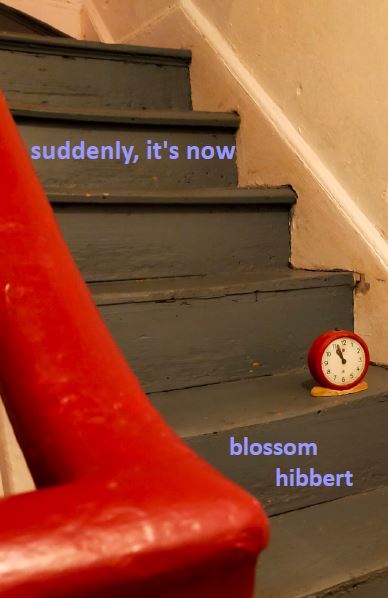
suddenly, it’s now by Blossom Hibbert
Leafe Press, £7.00
(28 pages of poetry)
suddenly, it’s now is a fun, dazzling and provocative debut pamphlet from a bright green voice in poetry. Blossom Hibbert hails from Sydney/Manchester but now lives in UNESCO City of Literature, Nottingham. I first fell under the spell of Hibbert’s vivid, glossy writing via the rather dubious medium of “Instagram”. I was sent a friend request by the poet. I was not her friend. I did not know her. However, averaging around two new friend requests per calender year, I impatiently clicked through to her page. Scrolling through the strange pictures of seagulls, toilets and washing machines with accompanying scribbles, there was something in the way she presented herself which felt off-kilter and original. I was enthralled, could she be a 21st century Selima Hill?
My copy of suddenly, it’s now, arrived in my inbox, suddenly. My favourite poem in the pamphlet doffs its hat to one of Frank O’Hara’s most beloved poems, his spellbindingly sweet ‘Having a coke with you’. Hibbert swaps O’Hara’s coke for her bathtub and titles her poem ‘Having a bath with you’. The New York School is a useful signpost for several of the hallmarks of Hibbert’s writing style: vivaciousness, intertextuality, irreverence. ‘having a bath with you’ is instantly compelling:
yes. world is rotating but tiger never
misses his prey and you
wearing blue trousers, eventually
stop touching my faded painting
yes. man in wet bath is leap frog
cold ears sticking out low clouds
yes.
assess risk.
arm is a
swan’s neck, well
swim toward him
then
The poem begins on a yes, a bright sounding note like the opening F of the Beatles ‘Hard day’s night’ or the first hit of the morning sun. O’Hara and Hibbert’s poems both feature a ‘you’ which works in two registers. In O’Hara’s poem the you is his lover, the dancer Vincent Warren and in Hibbert’s poem the you is a man wearing blue trousers. However because in both O’Hara and Hibbert this you is left rather vague, it could also be treated as invitational. On reading the poem it is the reader who is being addressed, so the reader might as well substitute themselves into the poem. The first detail Hibbert gives about the intended you, that he is wearing blue trousers, is also an O’Hara reference, picking up on his suggestive ‘tight blue pants’ in ‘Memorial Day’:
My mother and father asked me and
I told them from my tight blue pants we should
love only the stones, the sea, and heroic figures.
Wasted child! I’ll club you on the shins!
The poets share a puerile thrill in silliness. The key difference between Hibbert and O’Hara is perhaps the former’s way of weaving her words around blank space, Hibbert is more conscious of form – or formlessness – she writes with the avant-guard custom of moving the words away from the left-hand margin of the page. O’Hara on the other hand, busy in multiple dimensions, typed everything down as quickly as possible, tied to the left-hand margin.
O’Hara and Hibbert are united in sharing as much fun as possible in their poems, they are both hedonists, and this sense of pleasure bounces from every page of suddenly, it’s now, making for an exhilarating, uplifting read. It’s not just O’Hara who is an important touchstone for Hibbert; Lee Harwood is another key fragrance in the bouquet of her influences. Hibbert’s poem ‘five’ begins with a deeply romantic, almost spiritual, Harwoodesque image:
clock mutters five.
dreamt i held you. dreamt i had the biggest hand in the
world and held your neck
safely pining awfully resistible
which has a similarity in spacing and tone to the opening of Harwood’s quietly majestic ‘Book one’:
the soft dawn it’s light
I mean your body and how I ache now
yes, tremble
the words? how can they…
Hibbert shares what Mark Ford said of Harwood’s poetry, that it:
“creates a space in which perceptions, quotations, overheard snippets of conversation clippings from newspapers, outbursts of lyricism or unhappiness, inscriptions copied from gravestones, can succeed each other without seeming either merely random or too programmatically shaped.”
Furthermore there is a similarity in the profound sense of tenderness, jumbled together with the excitement of being in a young woman in the modern world. Hibbert’s pamphlet accelerates in a gorgeous incantatory light, picking up speed and tumbling through images and ideas with the verve and grace of a ballerina in a sprint finish. suddenly, it’s now is virtuosic, plus everything presented in elegant lowercase, the most stylish case, in case there are any doubts. Hibbert is a poet to get excited about. So get excited.
Charlie Baylis is from Nottingham, England. He is the editor of Anthropocene. His poetry has been nominated three times for the Pushcart Prize and once for the Forward Prize. His first collection of poetry a fondness for the colour green is published by Broken Sleep Books. He spends his spare time completely adrift of reality.
